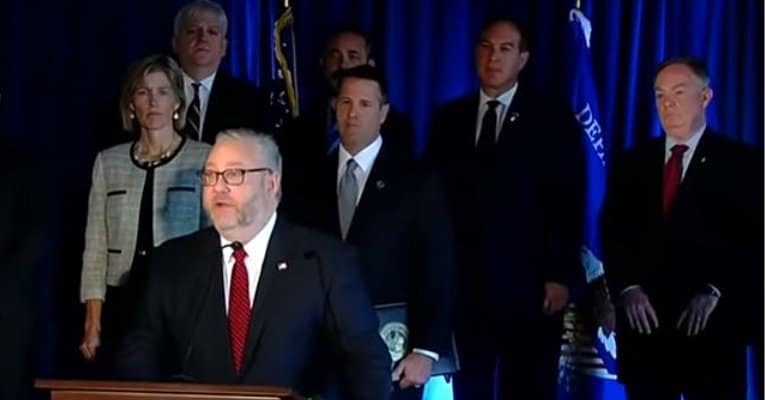(Elias Marat) In the biggest crackdown of its kind in the nation’s history, the U.S. Department of Justice (DOJ) has charged 60 doctors, nurses, and pharmacists with having illegally handed out millions of prescriptions for opioids in a pattern of malpractice that fed the flames of the ongoing opioid addiction crisis.
Related Police Documents Reveal 30 Year Cover-Up of Child Sex Abuse
by Elias Marat, April 22nd, 2019
Doctors and pharmacies appear to have allowed the drugs to flow into the region without even the slightest attempt at gaining control of the situation–especially in the Western District of Tennessee, where the most individuals and doctors were charged.
John Martin, an assistant administrator of the Drug Enforcement Administration, told Cincinnati Enquirer:
“Opioid misuse and abuse is an insidious epidemic. Unfortunately, Appalachia is at the center of it.”
One Tennessee doctor who was charged, relished his role as a dispenser of opiates, calling himself the “Rock Doc” as he prescribed 800,000 oxycodone and hydrocodone pills as well as 600,000 benzodiazepine tablets and 1,500 fentanyl patches over three years, according to the Justice Department.
During the same period, the DOJ claims that a doctor and several pharmacists operated an alleged “pill mill.”
In their indictment, the DOJ says:
“Between October 2015 and October 2017 alone, the pharmacy allegedly dispensed over 1.75 million pills.”
In total, 31 doctors, eight nurse practitioners, seven pharmacists and other medical professionals were charged in the investigation that spanned Alabama, Kentucky, Ohio, Tennessee, Virginia, and West Virginia.
Buy Book Rewired: A Bold New Approach To Addiction and Recovery
Brian Benczkowski, an assistant attorney general, said:
“If so-called medical professionals are going to behave like drug dealers, we’re going to treat them like drug dealers.”
Among those charged were dozens who billed Medicare and Medicaid for unnecessary prescriptions. Speaking to CBS News, Special Agent Derrick Jackson likened the abuse of taxpayer-funded health care programs to “federally-funded drug dealing.”
Officials told reporters that personnel has been on-hand to assist the public in any of their needs after the offices and clinics of those charged were closed.
Benjamin C. Glassman, the U.S. attorney for the Southern District of Ohio, said:
“When a doctor who has been prescribing opioids is arrested and his customers show up to find the clinic shuttered, public health and safety officials will be on site to get those folks the kind of help and treatment that they need … Enforcement and treatment are both critical, as of course is prevention, if we are to turn the tide of this opioids crisis.”
https://www.youtube.com/watch?v=u2I2DyVHxlE
Drug overdoses have skyrocketed in recent years, with over 70,000 fatal drug overdoses taking place in 2017 alone, according to the Centers for Disease Control. Many who abuse the pills have prolonged addictive fixations on opioids, with the hardest-hit age group ranging from 25 to 34 years old. A whopping 12,325 of 2017’s overdose deaths came from that age group, among whom two-thirds were men.
The addiction crisis has also branched out into heroin and the deadly synthetic opioid fentanyl.
Buy Book Dreamland: The True Tale of America’s Opiate Epidemic
Stillness in the Storm Editor: Why did we post this?
The preceding information reveals the corruption, malpractice and incompetence of mainstream medical institutions and related organizations. This information is important to comprehend so as to dispel any false trust you have with these institutions—which could cost you or your loved ones their life. That said, one should be intelligent with their health choices. We are not advocating for completely abandoning all modern medical services. We are simply encouraging you not to trust the system blindly. Be sure to ask plenty of questions, get second opinions, and do your own research as much as possible. We do not live in a world where one can blindly trust any government-dependent institution. With this hard truth firmly understood, one can begin the slow process of developing their own expertise insofar as health.
– Justin
Not sure how to make sense of this? Want to learn how to discern like a pro? Read this essential guide to discernment, analysis of claims, and understanding the truth in a world of deception: 4 Key Steps of Discernment – Advanced Truth-Seeking Tools.
Stillness in the Storm Editor’s note: Did you find a spelling error or grammar mistake? Send an email to [email protected], with the error and suggested correction, along with the headline and url. Do you think this article needs an update? Or do you just have some feedback? Send us an email at [email protected]. Thank you for reading.
Source:
https://themindunleashed.com/2019/04/60-doctors-charged-opioid-pills.html

Leave a Reply